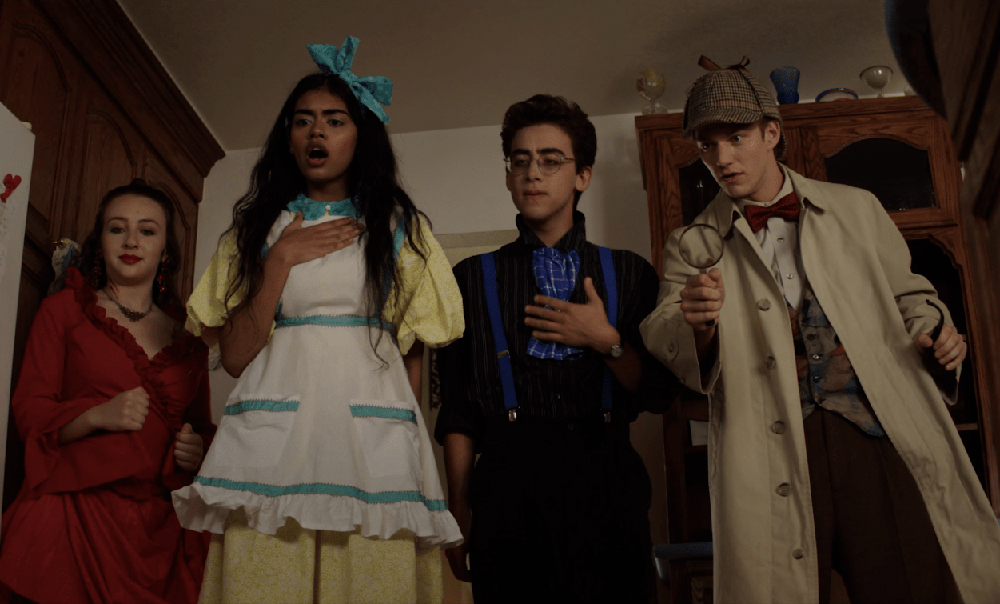Jonathan Wysocki had come up with a number of killer zingers for Ally, the drollest member of the theater club kids that populate his delicious feature debut “Dramarama,” but the moment he could get really excited about was when he started to see Danielle Kay, the actress playing the part, begin to truly make the character her own.
“She’s just naturally a writer herself and also a theater kid and there are definitely one-liners that she came up with that are in the movie,” recalls Wysocki. “And it was perfect. It’s like you already know the voice of this character, so it’s very easy for you to keep adding material in that voice.”
That kind of transference was never guaranteed when Wysocki had written so specifically to his own experiences as a closeted gay teenager growing up in conservative suburban enclave of Escondido, California in the 1990s, filling the script of “Dramarama” with pop culture references that would undoubtedly fly over the heads of a cast that hadn’t been born yet. However, not only does a devilish sense of humor travel across time, but Wysocki was pleased to find out that the emotional currents did as well, even in a time when kids appear to be growing up faster than ever, particularly when it comes to recognizing their sexual orientation. In “Dramarama,” the adults seem to know more than their children do, content to leave them unattended for a mixed-gender sleepover in which the murder mystery game, which requires all involved to dress up as the most outrageous characters as they can pull off, is the closest anyone will come to a prosecutable crime.
Yet the danger in the sharp comedy isn’t in the possibility of any specific act occurring, but in how the teens, all nervous about going their separate ways as high school seniors, act towards one another when as well as they know each other, they start to have emotions they can’t share with the group, starting with Gene (Nick Puglisi), who nurses a church on Oscar (Nico Greetham), though neither can know for sure if the other one is even gay, and Rose (Anna Grace Barlow) and Claire (Megan Suri), uncertain of where their futures lie, embrace what they know best, whether it’s theater or religion, in order to create an identity for themselves to buy time before understanding who they really are. A love of Broadway bonds them all, but Wysocki brilliantly observes how the ensemble may not know quite yet when a performance should end as the group’s indvidual fears of revealing what they’re really feeling in the moment threatens the friendships that had been built so strongly over the preceding four years.
Even after being forced into premiering online last year as a result of the pandemic, “Dramarama” leapt off the screen and perfectly timed to the end of summer when its considerable charms make for a refreshing treat and the idea of moving on to the next phase of life is getting real for millions of high school seniors, the film is opening theatrically in Los Angeles and available everywhere else via virtual cinemas, benefitting your favorite local arthouse. Recently, Wysocki was kind enough to talk about how he took inspiration in his own experience before letting the film take on a life of its own, finding his tribe of theater kids, and seeing real life reflecting the fiction he created.
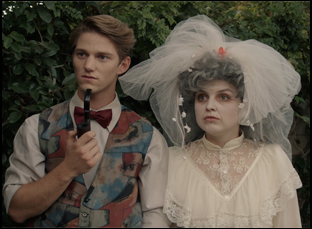
Right, yeah, yeah.
Did you find throughout the process of making this like you were unlocking some secret code and there was this instant understanding?
Yeah, obviously there’s a queer angle and the kids that are conservative and all these other angles in the film, but from the get go, my goal was to find my people. [laughs] It’s funny because I think every high school has a very small collection of theater nerds, but that’s always been true and always will be and even if you won’t continue to practice theater after you leave high school, you never stop loving that energy, that world and the special thing that comes out of that in terms of improv, so I was very conscious that this film would find all of those people.
You’ve said you looked back at old high school journals for inspiration – were you already on track to tell this story?
I had written a number of projects that had cast attached or financing and then fell apart and I thought, “Okay, let me stop chasing these bigger budget projects I had written and write something really small,” because I had a couple of friends who had made their first queer features just through doing a Kickstarter just so they could get it off the ground. But at the same time, I was like, “I want to make sure I really care about whatever this thing is because it’s going to be a lot of work.” That’s what led me to my high school diary to see if there’s something I could mine for an idea. And it was just so cringey. [laughs] The drama of who I wasn’t speaking or who wasn’t speaking to somebody else that week was just so funny, [especially] because I’m still friends with all of my high school friends. I just didn’t remember a lot of the fraught nature of our interrelationships and then the closeted aspect was just so clear in the pages even though it wasn’t clear to me in the time. Yet there was also all of this joy as well in terms of all of the silly things that we did and all the different shows we were in and how much we cared about those shows. There was just something on the page that I had not really seen in a coming-of-age film before, so I was like, “Okay, let me try to see if I can capture what’s specific here, but if I can put it in the mold of the universal coming-of-age story.”
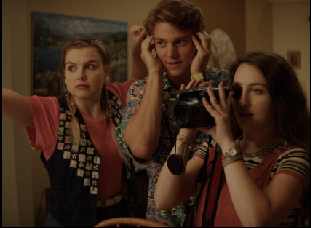
Yeah, I was very interested in leaning into the specifics of those theater dynamics with all of these things that were buried inside the characters in terms of their own fears and desires. All teenagers try on different identities and different roles, but there was something extra delicious about the meta layer of theater kids doing that. Theater kids try on different things in order to test the waters of who do I want to be and who do I want to present myself as and a lot of that in my memory was sexual-related, just in terms of the jokes and the double entendres and the games. There was so much sexual activity that was not happening in reality that was channeled through the theater and it’s very safe to do that — it’s safe to play a game like “Flashlight Homosexual” because you can just pass it off as a piece of theater, rather than actually having sex or going beyond our comfort zone. You can exist in that space of play the whole time and feel safe in that play.
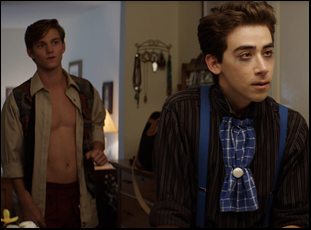
Honestly, I got so lucky. The casting director saw hundreds of actors and we really found the best person for each role, but we didn’t have the time to chemistry cast them together, so I really had to try to in my mind put them together and hope that these different energies are going to work. Not all of them were actual theater kids in real life, but enough of them were that they pulled the other ones in from day one, and they just got along like gangbusters. Even when the cameras were not rolling, they just got really comfortable with each other and with the idea that they were allowed to be those playful theater kids at all times. It was just so much fun as a director is when an actor is just able to run with what you’ve started with and they’re always filling their moments, even when they’re not the center of a scene, just because they felt that freedom.
The tiny window that I did have to rehearse with them, I immediately went straight into improvs with them so that they would know more about not only about their belief system, but also the nuances of how they felt about each other and just what those bonds were to the other characters in the film. To their testament, when I wasn’t able to run those improvs, they ran them themselves a lot of the time when they had downtime and it’s just a testament to how great they are as actors that they took the seeds of what was there and just continued to grow from them.
There were some aspects that were actually interesting to them in the culture we live in compared to the early ‘90s, particularly that scene where they’re debating the nuances of their different Christian beliefs, like “Well, you believe in this and I believe in this. And you know, abortion and some Christians are okay with abortion and some are not.” I think it was interesting to them that this group could still be friends even though they had different nuances in where they stood on issues and there was a lot of discussion on set about whether or not that could still happen today. That comparison was something I did not expect to happen.
This made me nostalgic in a number of ways. It’s amazing that you shoot this in one location and the energy is in the camerawork as much as the edit. Was it difficult to build that in?
I feel like a one-location film can go in many different directions, so I saw it as an exciting challenge and the cinematographer and I were always interested in motivating how we were going to shoot each room, based on what was happening in the energy of that point in the script, really leaning into when the kids are more in their mask-wearing performative stages, playing with the proscenium aspect of being on stage and then when things needed to feel more intimate and up close and when things needed to feel more detached. We’d make sure that the camerawork was also following the bursts of energy and get into the improv, the silliness and the creativity, but the ultimate goal was just trying to match the group energy with the camera energy and let that dictate how we were shooting in that one single location.
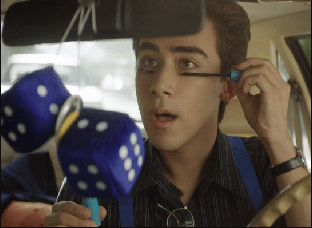
We actually shot in the valley and then we did one day in Escondido for exteriors, just to shoot the actual town. The house itself was in Chatsworth and I can’t tell you how hard it was to find a house where the bathroom and kitchen had not been remodeled since the ‘90s. It makes sense because when people have a house, they’re like “Oh, this kitchen looks dated and let’s rehaul this,” but it was more difficult than I thought it was going to be. Everybody’s gotten rid of their carpeting. But we really lucked out because the house was a pretty great time capsule and we actually raided my parents’ living room in Escondido, so they had like an empty living room for a month. [laughs] We just went down with a van and put everything inside of it and we had a great production designer to help us go the extra mile in creating that early ‘90s [look].
This is this major achievement for you when it’s your first feature and you have a wealth of experience, but was this any different?
I’ve wanted this for so long and I’ve had so many feature projects fall apart that this feels like such a gratifying victory. And I’m glad in some ways this was the first film because not all of the films I was trying to get off the ground were semi-autogbiographical, so this feels it was meant to be because it’s really about me and my friends. I’m already nostalgic about my own film, which is about nostalgia. [laughs] And features kids who are also nostalgic! There’s so much nostalgia happening. But it feels great, and I love the cast so much and I love that they love each other so much. They’ve become their own friend group and I didn’t set out to create a new friend group, but that’s actually what happened in a film about my own friends, which is pretty magical.
“Dramarama” opens on August 13th physically in Los Angeles at the Laemmle Glendale, virtually through the Music Box Theatre in Chicago and expands on August 20th. A full list is here.




